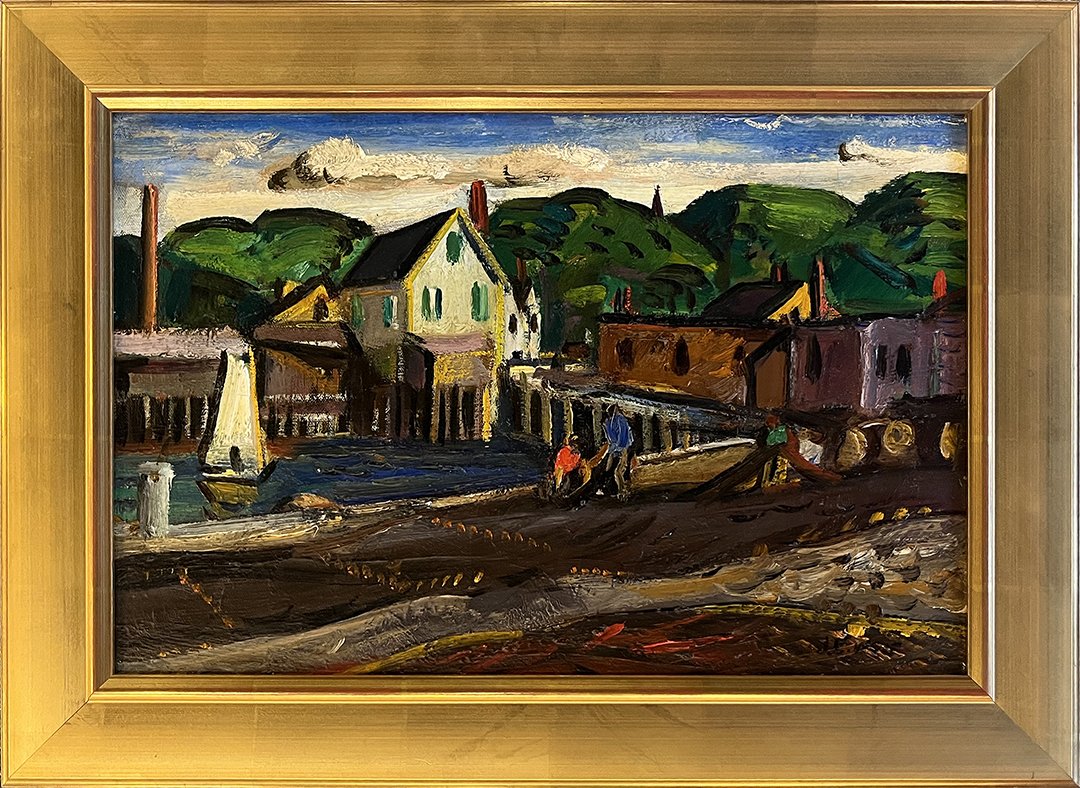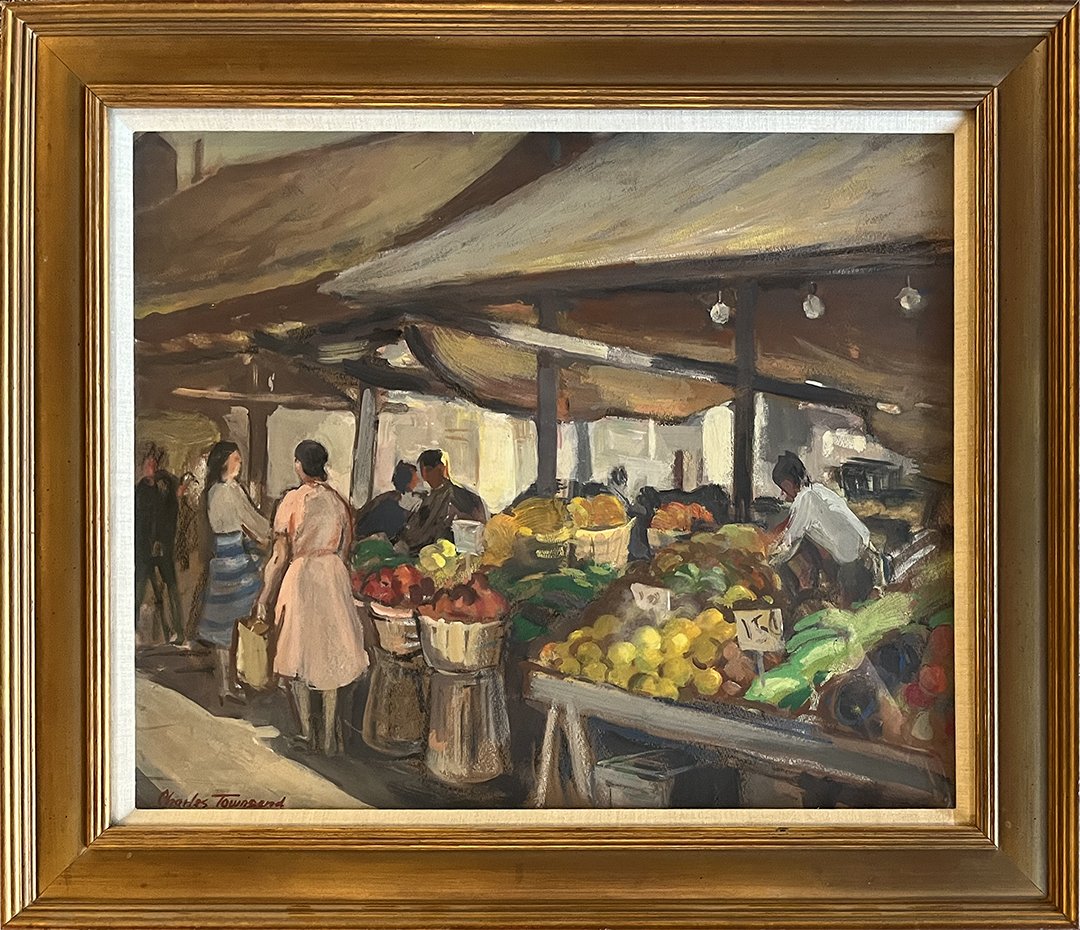Charles Townsend
Charles Townsend
Shapiro’s Market
Oil on Canvasboard
9 x 12 inches
Signed Lower Left
ID: DH3670
Charles Townsend was born in Indianapolis in 1911, one of four sons of Lawrence K. Townsend, Sr. and Jessie Cross Townsend. Mrs. Townsend died when the boys were relatively young, and since Lawrence was a salesman living in the Chicago area, they were raised in Irvington primarily by their maternal grandparents, Charles and Laura Lott Cross. Though the majority of Charles Townsend’s artistic career and adult life was spent in his chosen home of Cincinnati, prior to his death in 2003 at age 91, nothing pleased him more than fondly recalling his Hoosier roots in Irvington where William Forsyth gave him his first drawing lesson at age ten. He received instruction from well-recognized Indianapolis/New York artist Florence Smithburn at Tech High School, from which he graduated in 1929 – receiving a scholarship to John Herron Art School. Studying there under several scholarships until 1933, Mr. Townsend thrived under the direction of Dorothy Eisenbach who had been trained at the Pennsylvania Academy of Fine Arts, and would borrow his drawings in order to promote his work among her connections. There he was also the student of state flag designer Paul Hadley, to whom, typical of Mr. Townsend, he remained devoted for many years to come. Clifton Wheeler, another Irvington neighbor, was another instructor, as was Frank Schoonover of the Howard Pyle school.
Mr. Townsend’s Sept. 1946 application to attend the Art Academy of Cincinnati under the G.I. Bill of Rights lists early employment as a shipping clerk for the Indiana State Board of Health, and then as a draftsman for the Indiana State Highway Commission, Bureau of Materials and Tests. 1941 found Charles in the Civilian Conservation Corp in Hollandale, Miss.; and from 1942 to Dec.1945 he was in the Army Corp of Engineers, serving in the China, India, Burma Theatre. Arriving in Ledo, India via North Africa, Mr. Townsend was a non-commissioned Staff Sergeant. Years later, in a very disgruntled tone, he said that he had no war stories to drone on about, his main memory being that he was hunched over a drafting table for 18 months. It was a period in his life that he preferred never to think of again.
At the Art Academy from 1946-48, Charles had instructors such as Herman Wessel, John Weis, Arthur Helwig, William Hentschel, Leo Murphy, W. Gebhardt and Charles Schlapp – some of whom are now recognized as important Cincinnati artists in their own rights. Eventually studying graphic design under Jack Storey at Central Academy at night, he worked as a technical illustrator and designer in Cincinnati industry by day, ending up at Procter and Gamble. It was at the Academy that Charles met another talented art student, fashion-illustrator Melba Ann Reilly, who became his wife in 1964. Both of the Townsends were long active in the Cincinnati Art Club, to which many of the Academy teachers also belonged.
During the war, Mr. Townsend had been known for his pencil-sketched portraits of his buddies done by the light of coal oil lamp or on the deck of a troop transport; later in Cincinnati for his oil and mixed media cityscape and landscapes, many including the river. Still lifes of varying types and sizes were another accomplishment. And lastly, a favorite drawing medium became a wide nib felt pen because it forced him to loosen up and work more directly – an escape from the technical illustration hard lines with which he earned his living.
Mr. Townsend exhibited at the Hoosier Salon, the Indiana Artists Annual Exhibition, the Artists of Greater Cincinnati and Vicinity, the Professional Artists of Cincinnati, and the Cincinnati Art Club. In Indiana, his works are in the permanent collections of the Irvington Historical Society; in Cincinnati, at the University Club, the Cincinnati Zoo and Botanical Garden, Spring Grove Cemetery, and the Clifton branch of the Public Library of Cincinnati and Hamilton County; in Kentucky at the Behringer-Crawford Museum in Covington, and the City Building in Newport. Even more important to such a modest man, many of his works are owned and enjoyed privately.
Note: Information for this biography was drawn from a biographical sketch of Charles Townsend by Joe Gonzales that appeared in Dragonfly, the publication of the Cincinnati Art Club in November, 1975; also from many conversations between Mr. Townsend and Steve Anshutz that occurred between 1987 and 2001.





